The workshop, in Montpellier, France, was organised by Matt Silk and Olivier Gimenez and was attended by around 12 experts in statistical models for ecological data and in network modelling. 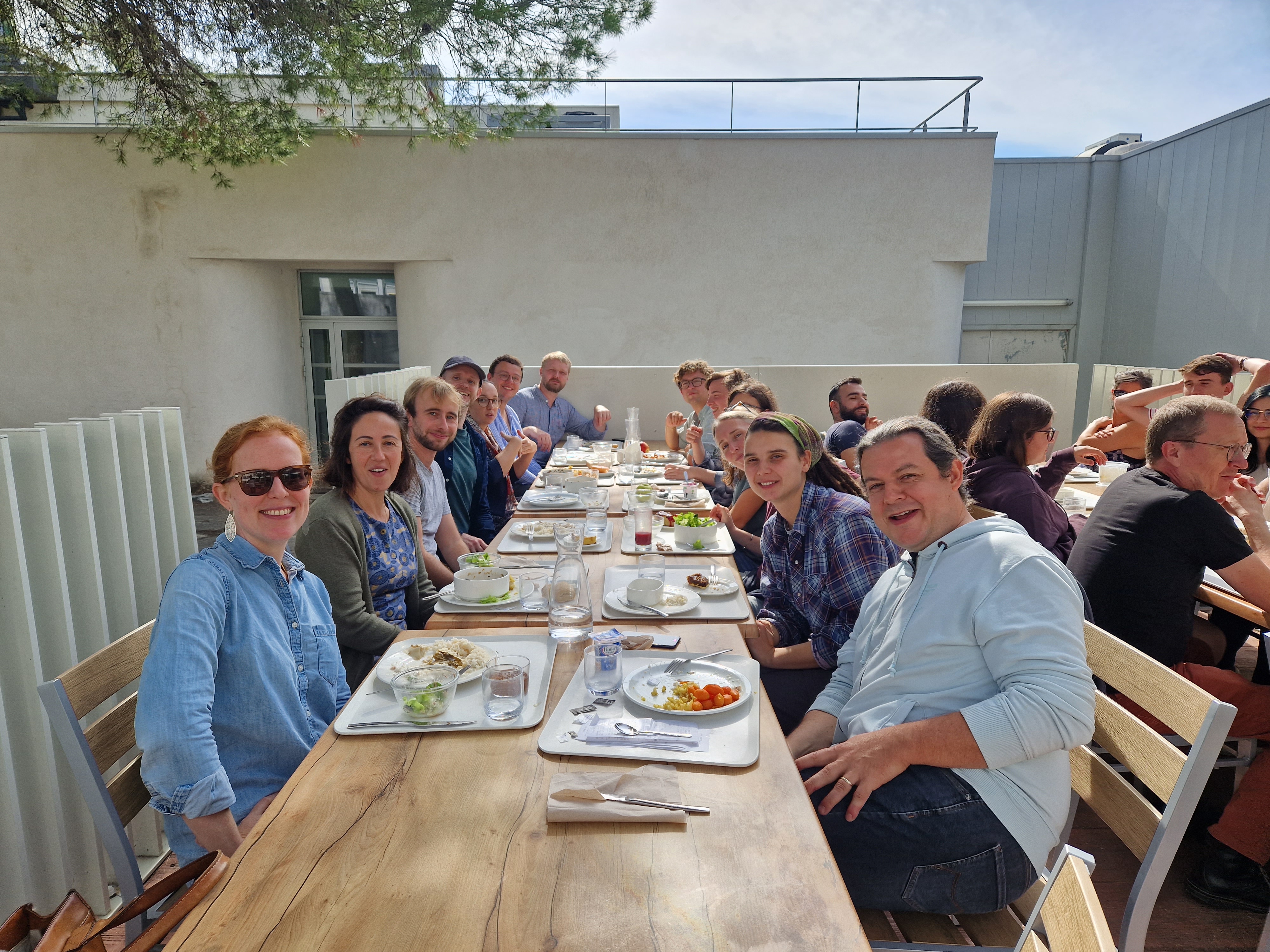

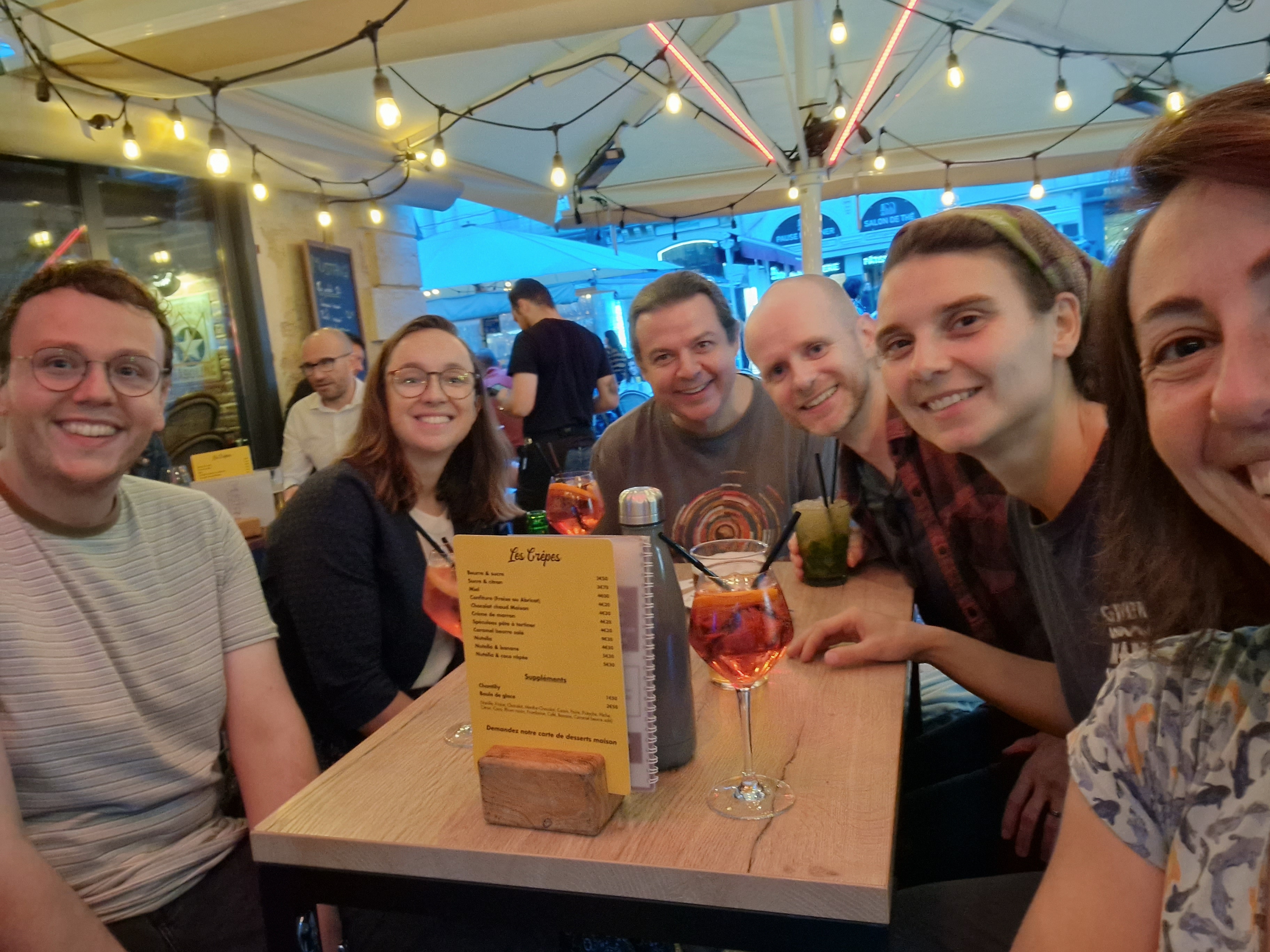
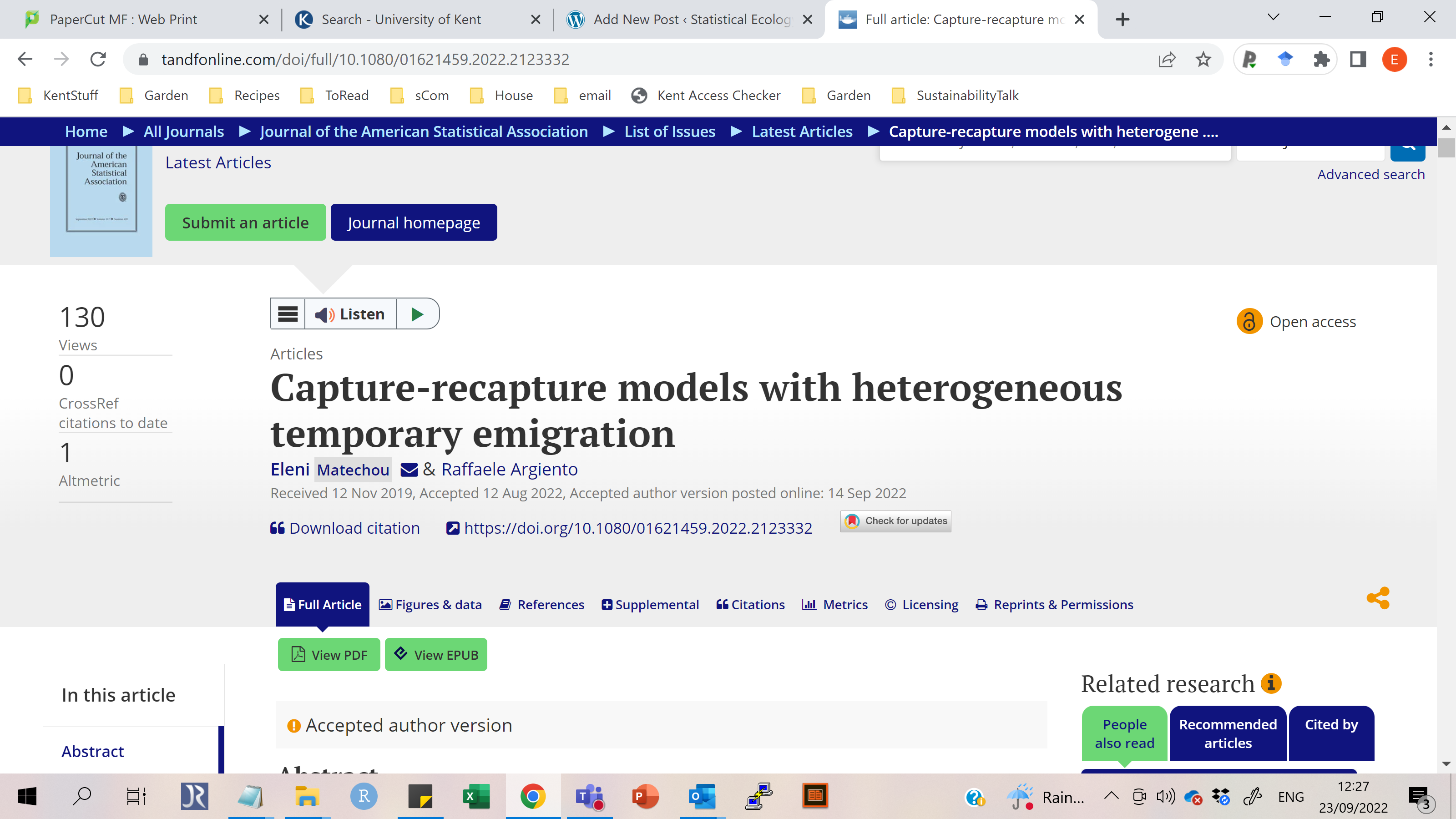
JASA paper by Eleni and Raffaele
The paper, titled “Capture-recapture models with heterogeneous temporary emigration”, first published online on the 14th of September 2022, develops a novel modelling framework for capture-recapture data without relying on the assumption of permanent emigration. The model is built within a Bayesian non-parametric & changepoint process framework, and is demonstrated on data on salmon anglers in Norway.
rGAI: An R package for fitting the generalized abundance index to seasonal count data
Emily Dennis, Calliste Fagard-Jenkin and Byron Morgan have created an R package for fitting the generalized abundance index to seasonal count data. The work has been published in Ecology and Evolution in the paper “rGAI: An R package for fitting the generalized abundance index to seasonal count data”.
The paper can be found at: https://onlinelibrary.wiley.com/doi/full/10.1002/ece3.9200
The R package is available at: https://github.com/calliste-fagard-jenkin/rGAI
Statistical Ecology Conference
Members of SE@K group attended ISEC from 27th June to 1st July. Some went to South Africa to attend in person others attended virtually.
Eleni, Alex and Ioannis gave a half day workshop on Modelling environmental DNA data.
Eleni presented work on Capture recapture models with heterogeneous temporary.
Alex gave a talk on A unifying modelling framework for metabarcoding data.
Rachel talked on Model selection for integrated population models: selecting age structure with multiple data types.
James’ presentation was on Accounting for varying spatial scales in the production of UK butterfly abundance estimates.
Diana talked about Bayesian Identifiability in Ecological Models.
Fay presented work on Assessing the success of reintroductions whilst accounting for multispecies populations.
Bryon talked about Fitting dynamic occupancy models to very large occurrence data sets using hidden Markov models.
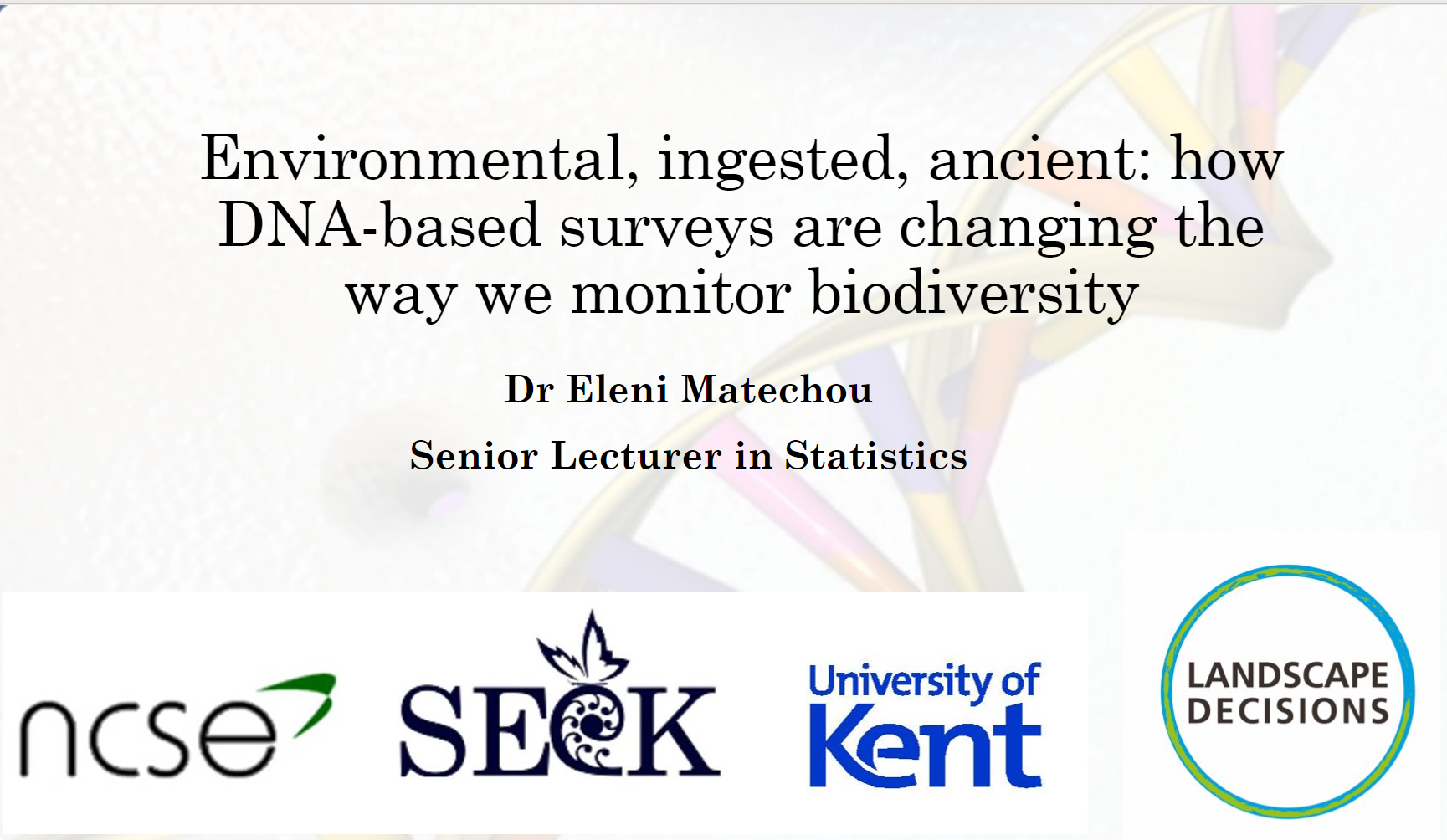
Eleni gave talk as part of sustainability event
Eleni presented her work on new models for DNA-based biodiversity monitoring as part of the sustainability lecture series organised by SMSAS.
The talk explained why it is important to monitor biodiversity and why it is challenging and how DNA-based surveys can help us overcome some of these challenges.

Eleni awarded Knowledge Transfer Partership with NatureMetrics
NatureMetrics is an innovative, science-based, women-led SME that commercialises environmental DNA-based biodiversity monitoring solutions at scale. They are world leaders in delivering powerful, scalable biodiversity data collected safely and sustainably using environmental DNA. NatureMetrics work to develop end-to-end and automated tools for biodiversity detection in the field, to be used by non-experts.
This KTP aims to develop and integrate new statistical techniques for addressing two challenges associated with biodiversity surveys using environmental DNA: accounting for error and noise in environmental DNA surverys, and optimising survey design. These techniques will improve the business’s decision-support tools for nature conservation and restoration, facilitating access to new markets.
NatureMetrics’ mission is to bridge the gap between molecular techniques and environmental management by using cutting-edge DNA analysis to monitor biodiversity and measure natural capital in the environment and this KTP will enable them to achieve this mission.
Specifically, the aim of this KTP is to embed new knowledge and capabilities of Bayesian hierarchical statistical models developed by academics at the University of Kent (Dr Eleni Matechou) and University College London (Professor Jim Griffin). Through this KTP, these techniques will be integrated into NatureMetrics’ analysis workflows, enabling them to increase confidence levels around the presence/absence or relative abundance of surveyed biological communities (i.e. collections of species at a site) in downstream products. This will optimise the cost and effort needed to collect and analyse samples.
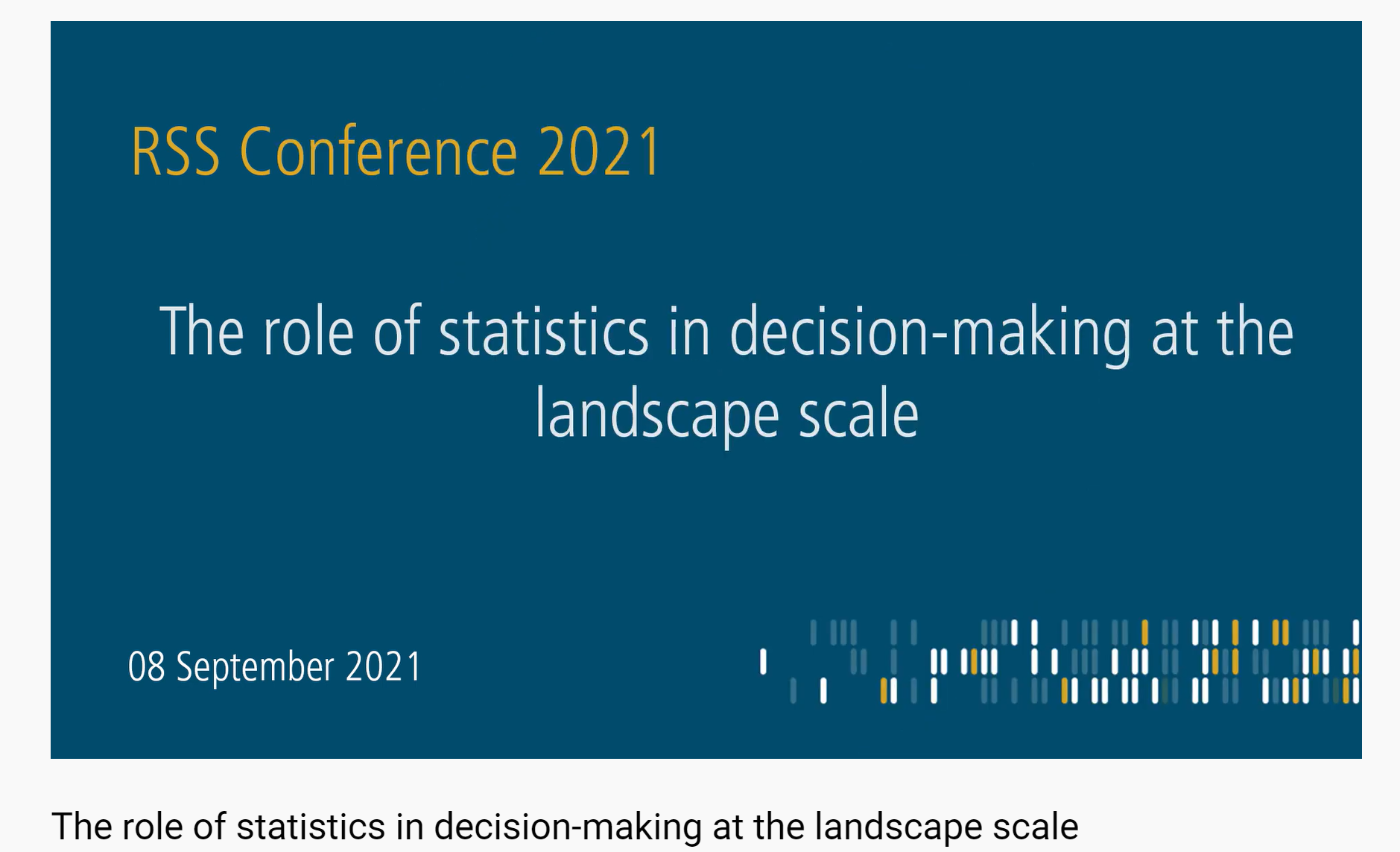
The role of statistics in decision-making at the landscape scale
The recordings of the invited session, organised by Eleni as Chair of the Environmental Statistics Section, at the 2021 RSS conference are available on the RSS youtube channel
Landscapes are continuously changing, either naturally of because of human intervention. It is important to understand these changes, their short- and long-term effects and the associated risks, and to make decisions on the need and way to stop or reverse changes when required. This session demonstrated how statistics are currently used to inform decision-making at the landscape scale, with pollinators, animal populations, air pollution and droughts as case studies and will highlight emerging statistical challenges within landscape decision-making, specifically around assimilating data from both numeric and non-numeric perspectives.
The session, which took place on Wednesday 8 September 2021 14.20-15.40, featured talks by Mark Brewer (BiOSS), Richard Everitt (Warwick), Emma Gardner (Reading) and Carly Stevens c.stevens@lancaster.ac.uk (Lancaster)
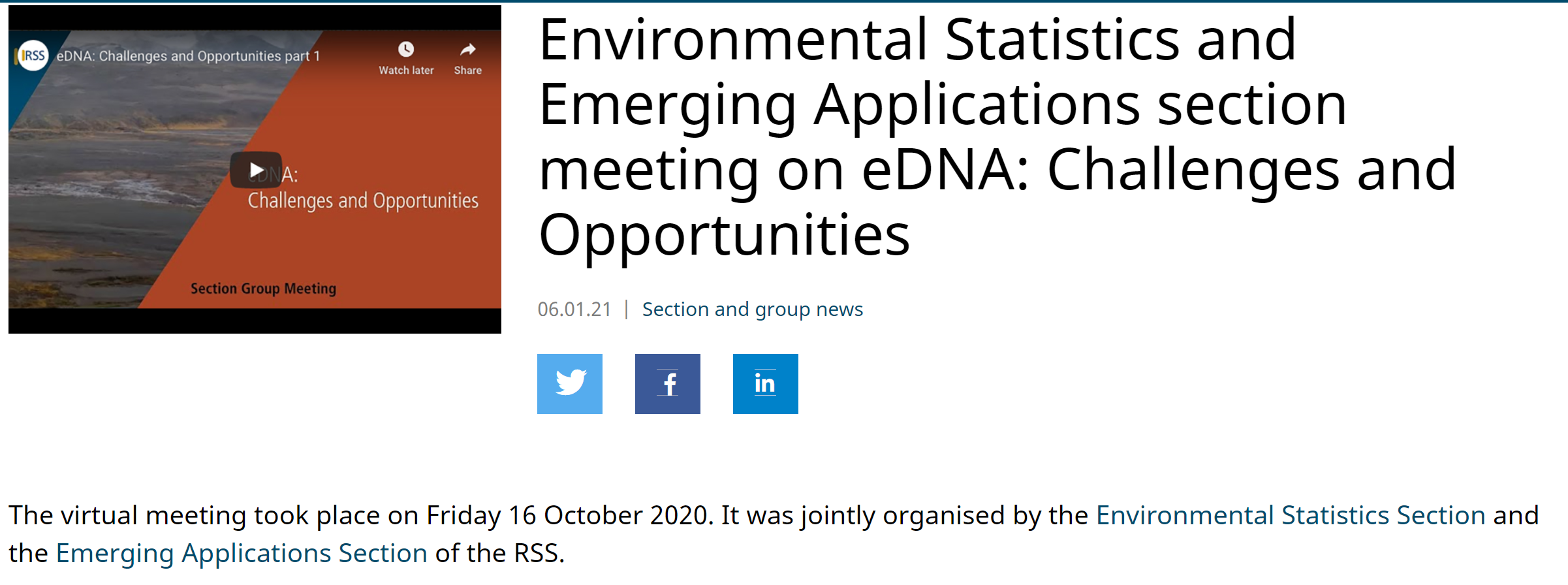
eDNA: Challenges and Opportunities – meeting report
Dr Eleni Matechou, chair of the Environmental Statistics section of the Royal Statistical society, has published the following report about the meeting
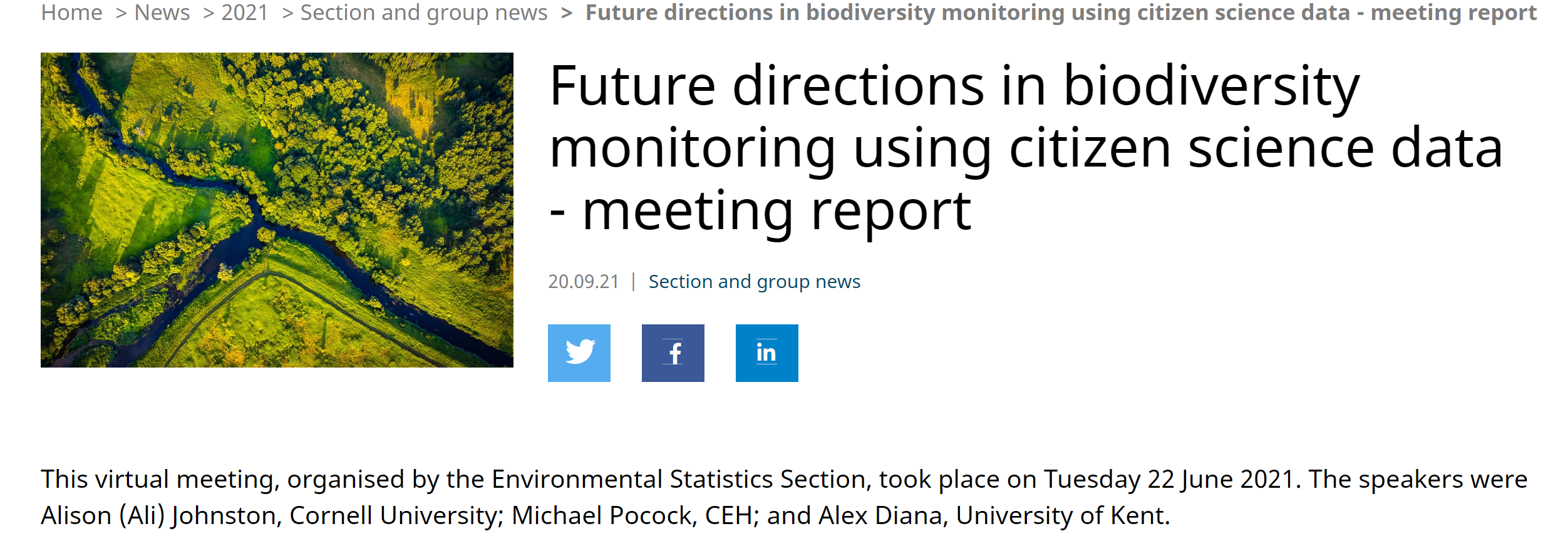
Future directions in biodiversity monitoring using citizen science data – meeting report
Eleni Matechou, chair of the Environmental Statistics section of the Royal Statistical Society, has published the following report about the meeting
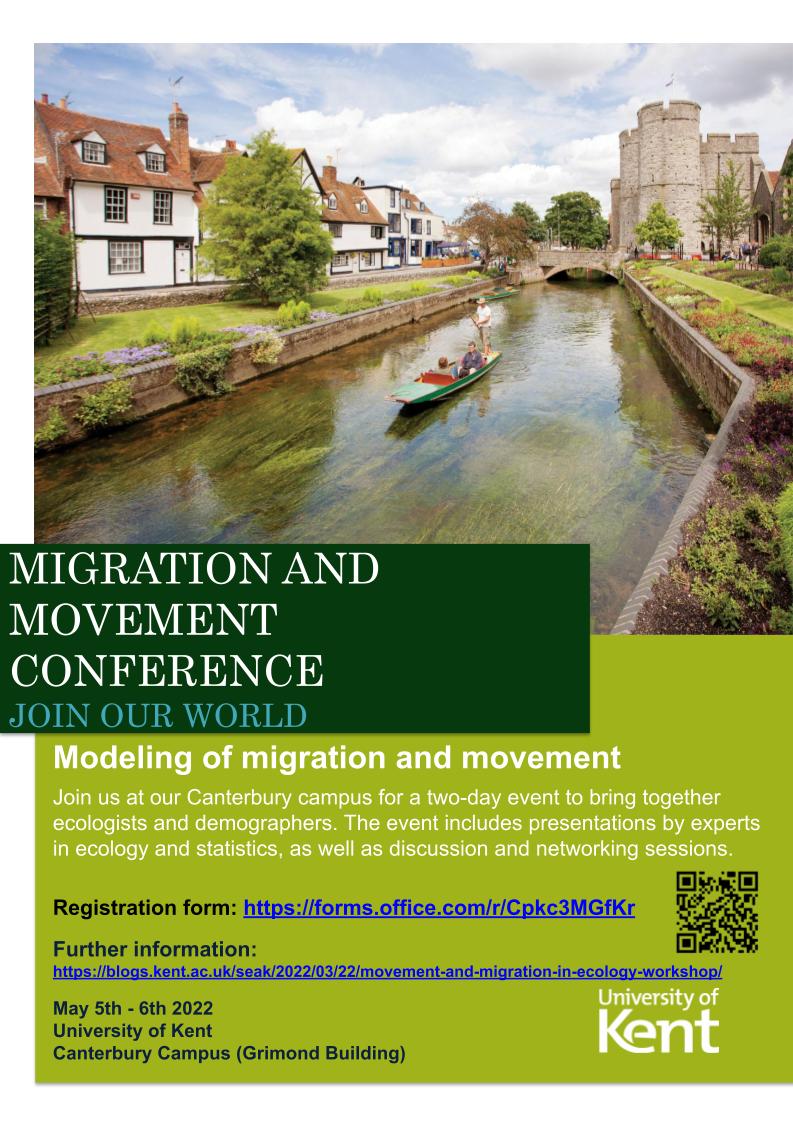
Movement and migration in ecology workshop
Daniel Bearup, Eduard Campillo-Funollet, Eleni Matechou and Bruno Santos were awarded funding from the University of Kent’s Migration and Movement Research Theme to run a 2 day workshop 5/6 May 2022.
The workshop will be themed around modelling of movement and migration, with the goal of identifying opportunities for collaboration between mathematicians, statisticians, ecologists and demographers, as well as discussing novel approaches within this theme.
The event will be face to face and take place on the University of Kent campus, in Grimond Building (in Lecture Theatre 1), with some virtual talks, to encourage interaction between participants and invited speakers.
The workshop will feature three broad themes, each covering corresponding approaches for modelling migration and movement: 1) Statistical Ecology 2) Mathematical Modelling 3) Demography and Social Sciences.
There is an exciting line up of speakers (see list below) from the UK and abroad.
Registration for the event is now closed. If you would like to attend and did not get a chance to register then you are welcome to attend the talks but please note that hospitality has only been ordered for 30 attendees.
Programme
Thursday 5th – Morning
- Frans Willekens (virtual) 9.45-10.30 45′ Emeritus professor of Demography at the University of Groningen
- Dave Roberts 10.30-11.15 45′ Reader in Biodiversity Conservation at the University of Kent – Slides
- Coffee break 11.15-11.45
- Eleonora Mussino 11:45-12:30 45′ Docent at the Stockholm University Demography Unit – Slides
- Discussion/networking 12:30-13.00
- Lunch 13.00-14.00
Thursday 5th – Afternoon
- Ruth King (virtual) 14.00-14.45 45′ Thomas Bayes’ Chair of Statistics at the University of Edinburgh – Slides
- Fay Frost 14:45-15.05 20′ PDRA at the University of Kent – Slides
- Coffee break 15.05-15.40
- Alex Diana 15.40-16.00 20′ PDRA at the University of Kent – Slides
- Sergei Petrovskii 16.00-16.45 45′ Professor in Applied Mathematics at the University of Leicester – Slides
- Wrap up/networking 16.45
Friday 6th – Morning
- Jonathan Potts (virtual) 9.45-10.30 45′ Senior Lecturer in Mathematics at the University of Sheffield – Slides
- Luca Borger 10.30-11.15 45′ Professor in Ecology and Biodiversity at the University of Swansea
- Coffee break 11.15-11.45
- Luca Giuggioli 11:45-12:30 45′ Reader in Complexity Sciences at the University of Bristol
- Discussion/networking 12:30-13.00
- Lunch 13.00-14.00
If you are driving to campus then you can find information on parking here.

